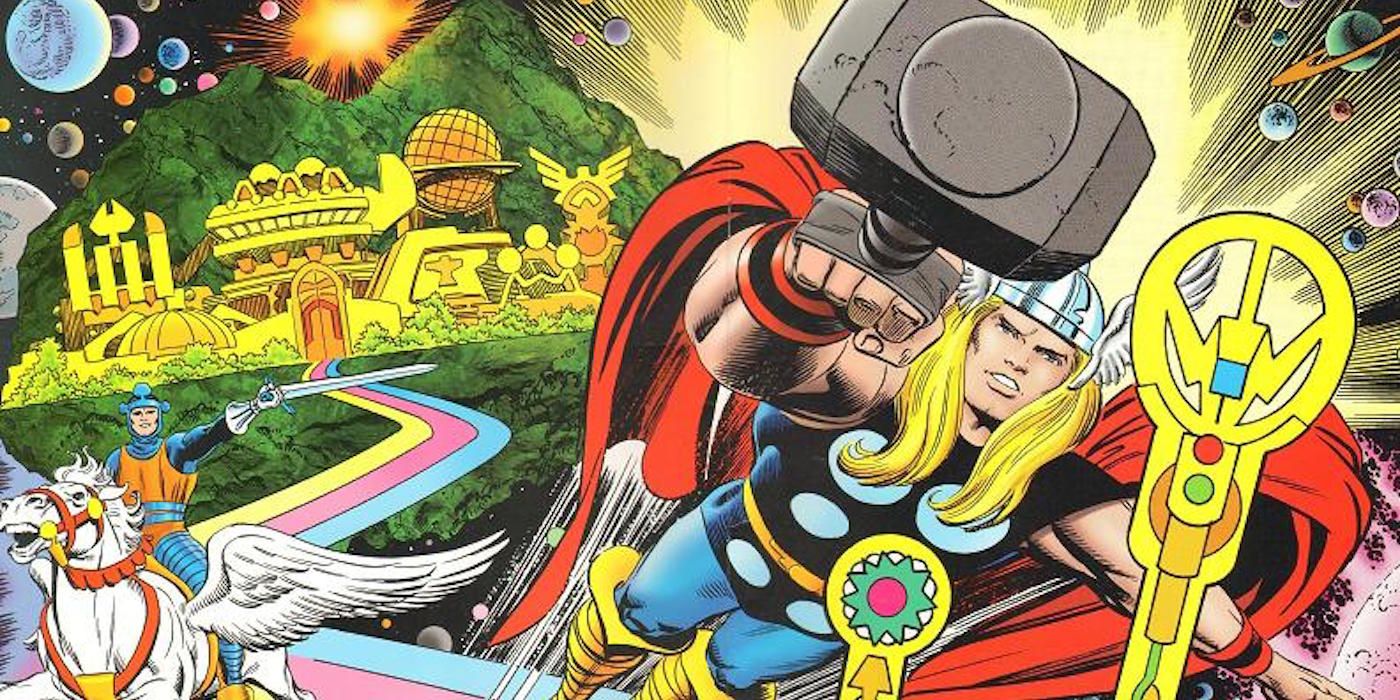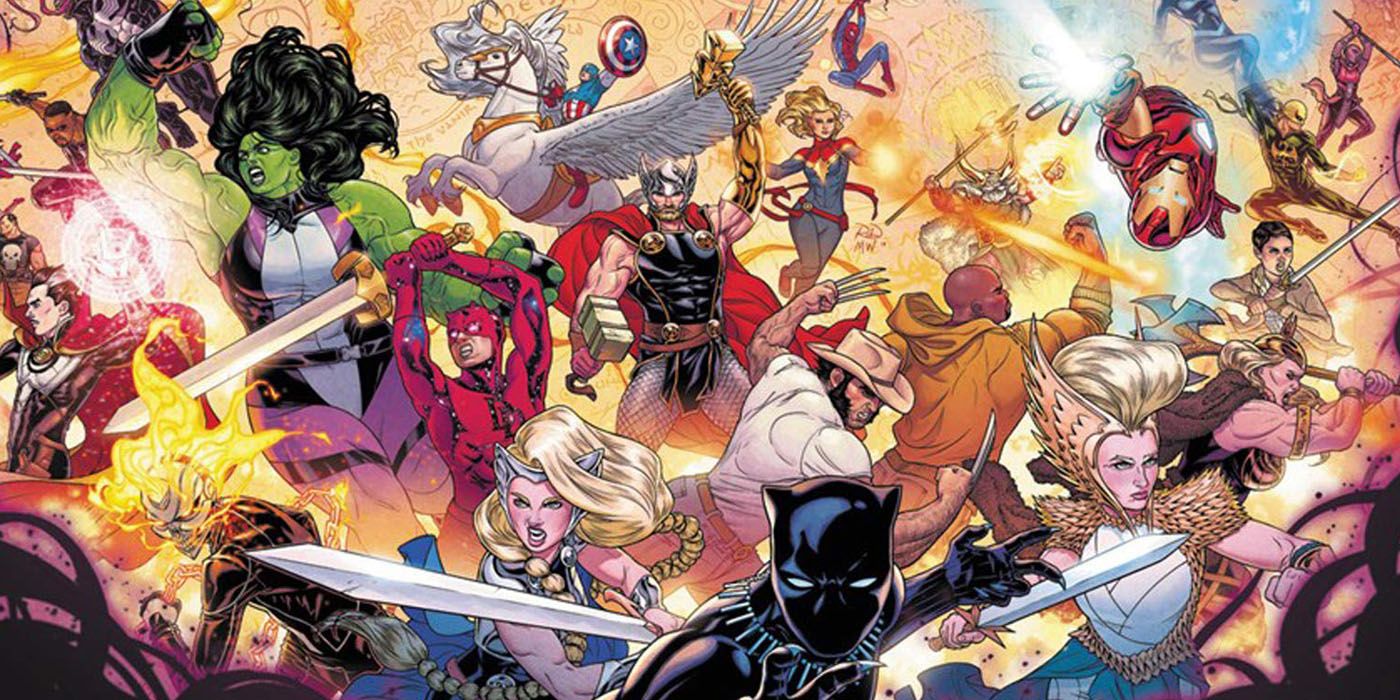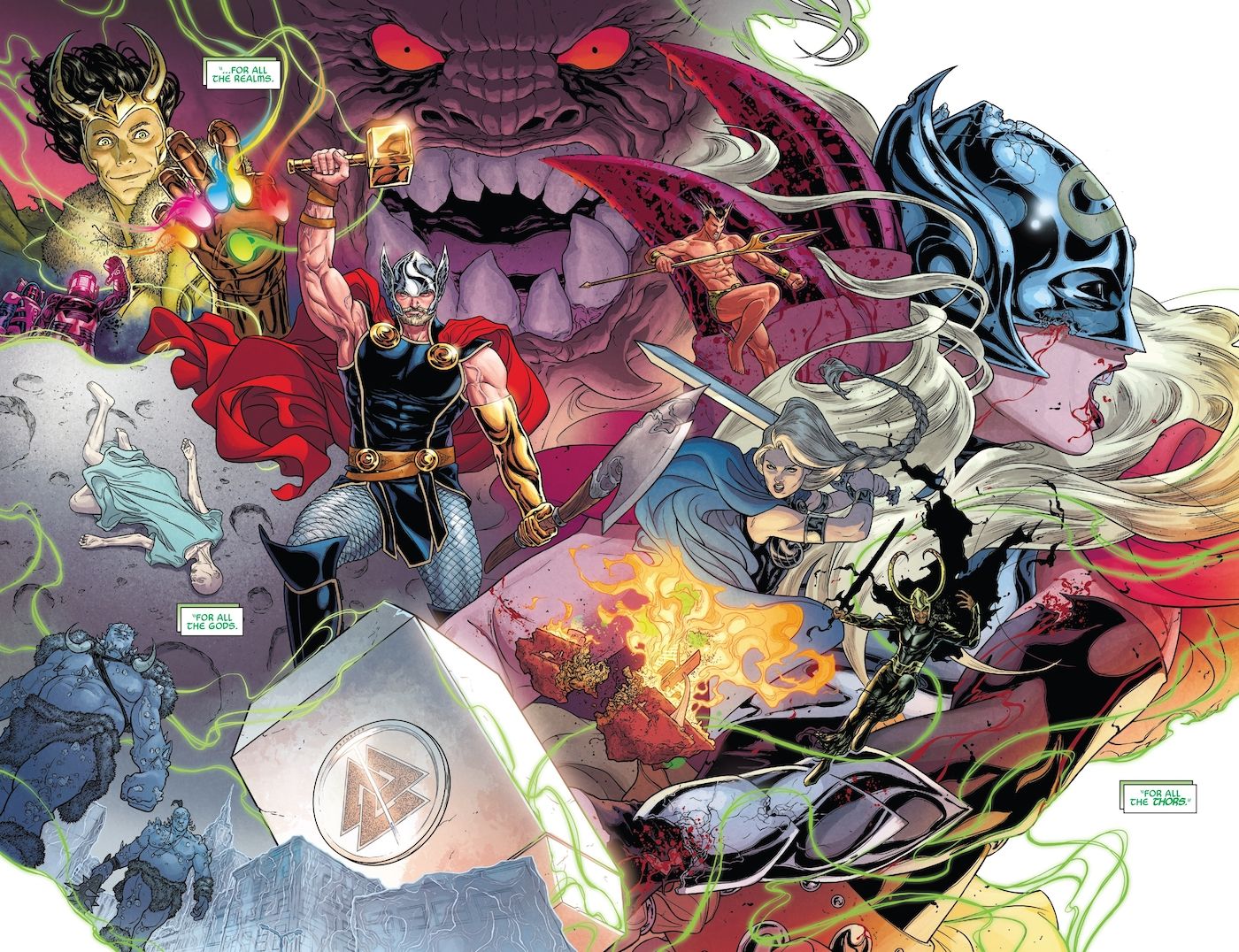During one of the longest single-author runs in recent comics history, Jason Aaron redefined Thor and his Marvel mythos, crafting a story that is praised and acclaimed by critics and readers. Since Donny Cates took the helm of the series in 2020, he has both further elaborated Aaron’s vision of the God of Thunder and started defining his own, so this is the right time to assess Thor’s recent legacy and the direction that the character is headed towards.
Thor stands out as odd even in the gallery of bizarre and unique characters that populate the Marvel Universe. Stan Lee and Jack Kirby essentially “borrowed” him from an already-existing narrative universe (Norse mythology and its associate tales), a practice that would later be repeated, incorporating entire pantheons and mythos in the Marvel world, but Thor is where it all started. Books have been written to explain the parallel between superheroes and the gods and legends of ancient mythology, and it’s easy to agree with that concept. It is no coincidence that Thor is often considered Marvel’s Superman, as the latter is the quintessential representation of the “modern god” concept that DC has built its comics universe around. However, Marvel took a different approach right from the start, grounding its heroes in “real life,” making them a little less godlike and a lot more human: they can fail, they can suffer, they make mistakes. But how do you apply these concepts to a character that is a god by definition?
This has been perhaps the major issue that the creative teams behind Thor had to deal with for the past 50+ years. Sure, everyone can enjoy a Thor adventure where he travels across space to punch some cosmic villain in the face, or where he fells hordes of Frost Giants with his mighty hammer, but ultimately even the tales from ancient myths are still relevant today because they teach us something about ourselves as human beings. So how can you make a character relatable, when by its own nature he is above humans? Jason Aaron answered that question brilliantly: by making a god human. This is essentially what Lee and Kirby did in the beginning, bounding Thor to the mortal Donald Blake, but that was destined to be a temporary solution, a plot device that did not affect the character’s core essence. Aaron, instead, took one simple word, which is embedded in that core and has defined Thor since his debut, and used it to connect the divine and the human. The word is “worthy.”
Whosoever Holds This Hammer…

Aaron’s journey on Thor is an exploration of what it means to be worthy. Gods are considered worthy by nature (of their status, of their superiority, of their immortality), but this concept is immediately ripped apart in Aaron’s first narrative arc by the bloody hands of Gorr, the God Butcher, a creature who lives (and kills) only to prove that the gods are, in fact, not worthy at all, that they are impostors who do not deserve their status. Through Gorr, Aaron questions the concept of intrinsic worth and the hubris of those who assume that worthiness is either a birthright or, in Thor’s case, something that you can never lose once you acquire it. Aaron makes clear that no god can truly be worthy, because they never question if they are. It is a powerful cautionary tale about how self-righteousness and immutable beliefs can lead to extremism and suffering.
Thor has his beliefs shaken during his confrontation with Gorr first, and then by becoming literally “unworthy” and unable to lift Mjolnir during the Original Sin event, after Nick Fury whispers in his ear three simple words: “Gorr was right.” The fact that Jane Foster becomes the new Thor by picking up the hammer is not only one of the boldest and most controversial moves in recent comics history. It makes perfect sense in Aaron’s story because Jane is Gorr’s opposite. She fights for the gods despite all their faults and failures, including abandoning her in her moment of need. She holds them accountable not by punishing them, but by inspiring the gods to do better.
Let There Be War

Thor has to learn these lessons to become worthy again, and he does it by experiencing two things that also define “being human”: conflict and defeat. War is the second major theme in Aaron’s run on Thor, to the point that his seven years of storytelling all converge in the end into the major War of the Realms event. The fact that this was expanded to be a company-wide crossover is a testament to the excellent work done by Aaron until that moment, but War of the Realms is essentially a story of Thor and his family, Odin, Freya, Loki, and Jane, and how they all find their answers.
It is also, more than the previous arcs, an epic tale in the widest sense. Aaron spent six years building to this, showing the readers what it’s like to watch a war arise, to see the world crumble little by little and witness the events proceed towards a catastrophe without being able to stop it, with no control over it. It is the most humbling lesson possible for a god, but through it, Thor finally learns what it truly means to be worthy. Even after Jane gives him back the title of Thor, the Odinson keeps struggling with his conscience after Mjolnir is destroyed to kill the Mangog, because he still believes that the title and the hammer are linked, and that only by passing Mjolnir’s test of worth can one truly become Thor. At the end of the war with Malekith, Thor realizes that worthiness is not a state, it is a process. Questioning and struggling with power are the only ways to be worthy of that power. Doubt is strength, and by coming to this conclusion Aaron has essentially turned the epitome of a “god” into the epitome of what being “human” means.
Where To Next?

Donny Cates had big shoes to fill when he took over as writer on Thor. He eased into them by sticking, in his first arc, to what he was familiar with: grand cosmic sagas. In his first six issues, readers see Thor become the herald of Galactus, find out that the World Devourer has a master, and then witness Thor killing both of them. However, Thor becoming the All-Father Thor and the King of Asgard seemed once again to be too far from the struggles of mortals to be relatable. Enter Donald Blake: Thor’s first “hook” into humanity, turned by Cates into a psychopath killer. It was a great idea, but in the end, there were no deeper lessons to be learned, just an enjoyable story where Thor ends up beating the bad guy. Aaron’s run, however, proved that Thor is the perfect comic book to build mythologies and do long-form storytelling.
Cates seems to be staying close to Aaron’s focus on worthiness as a concept, but also trying to push the stakes even further. How can Thor be the All-Father when he just barely realized how to be Thor? He runs from that destiny too, and Mjolnir has abandoned him once again, albeit for different reasons. The continuation of these themes from Aaron’s run show how large his legacy looms. Thanks to Jason Aaron‘s work, Thor has cemented his status as one of Marvel’s flagship characters, and readers are looking forward to seeing what battlefields the God of Thunder will cross under Donny Cates’ direction.




